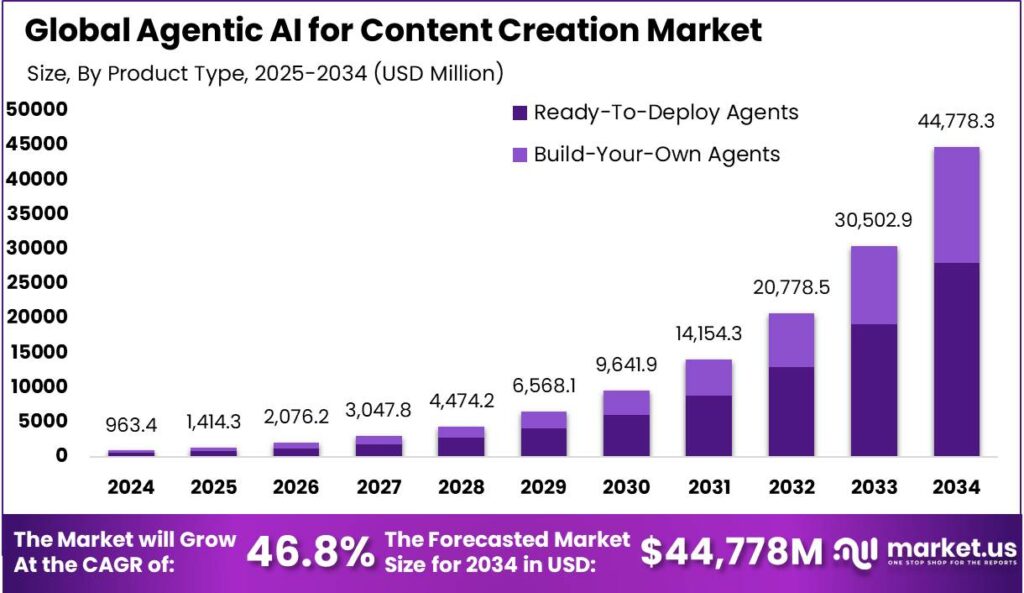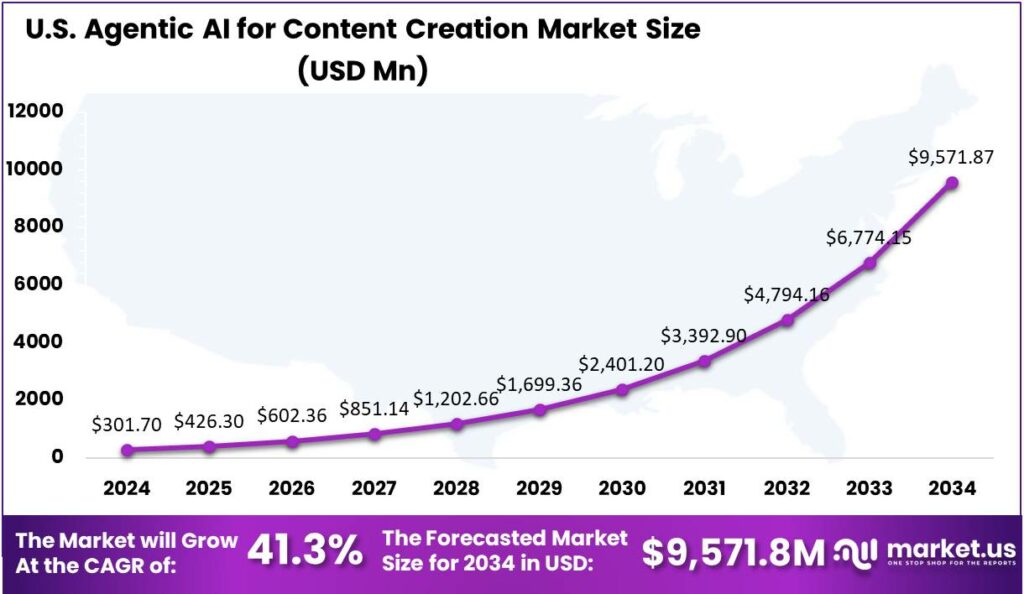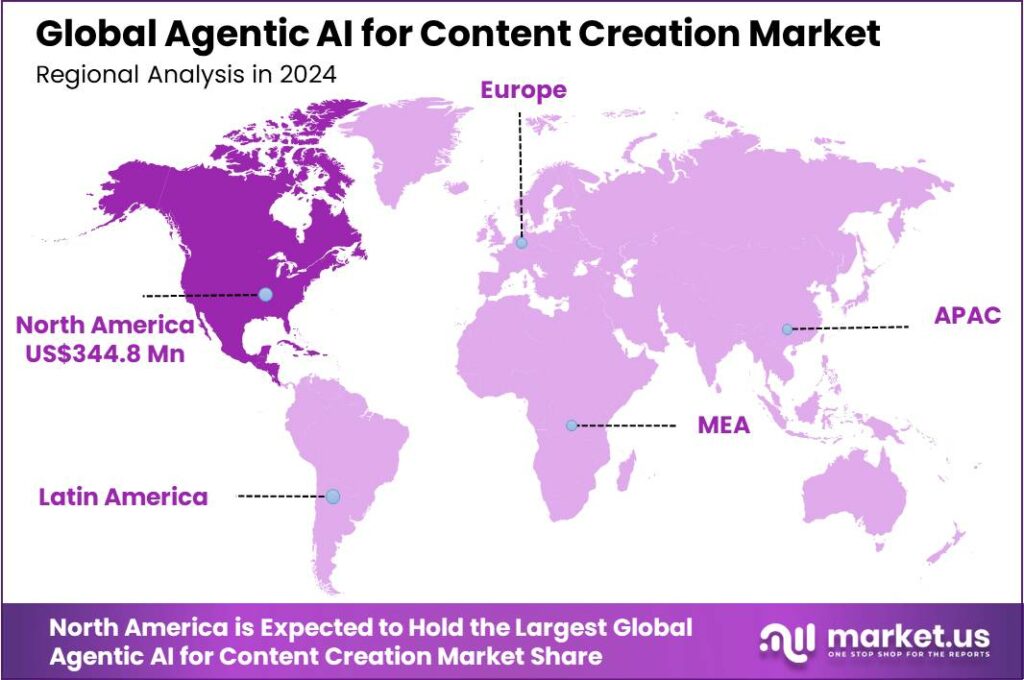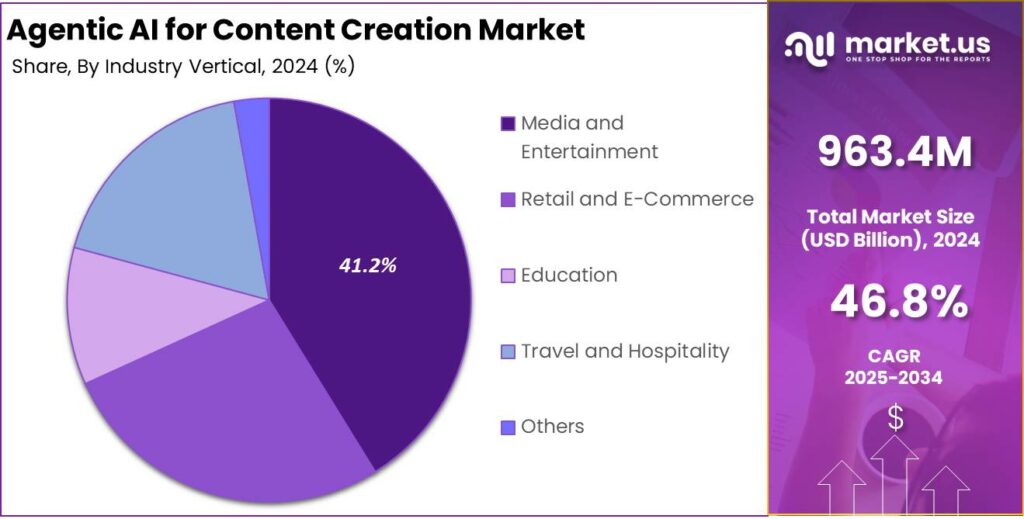Global Agentic AI for Content Creation Market Size, Share, Statistics Analysis Report By Type (Text-Based Agentic AI, Visual Content Creation, Others), By Product Type (Ready-To-Deploy Agents, Build-Your-Own Agents), By Deployment Mode (Cloud-Based, On-Premises), By Industry Vertical (Media and Entertainment, Retail and E-Commerce, Education, Travel and Hospitality, Others), Region and Companies - Industry Segment Outlook, Market Assessment, Competition Scenario, Trends and Forecast 2025-2034
- Published date: February 2025
- Report ID: 140154
- Number of Pages: 351
- Format:
-
keyboard_arrow_up
Quick Navigation
- Report Overview
- Key Takeaways
- U.S. Market Size
- Analysts’ Viewpoint
- Type Analysis
- Product Type Analysis
- Deployment Mode Analysis
- Industry Vertical Analysis
- Key Market Segments
- Driver
- Restraint
- Opportunity
- Challenge
- Emerging Trends
- Business Benefits
- Key Player Analysis
- Top Opportunities Awaiting for Players
- Recent Developments
- Report Scope
Report Overview
The Global Agentic AI for Content Creation Market size is expected to be worth around USD 44,778 Million By 2034, from USD 963.4 Million in 2024, growing at a CAGR of 46.80% during the forecast period from 2025 to 2034. In 2024, North America dominated the Agentic AI for Content Creation market, holding over 35.8% of the global share, with a revenue of USD 344.8 million.
The market for agentic AI in content creation is rapidly expanding, driven by its ability to significantly reduce the time and resources needed to produce content. By automating the generation of personalized content, businesses can achieve greater engagement while optimizing their marketing efforts. This technology is not only transforming the media and advertising industries but is also becoming integral in areas like customer service and educational content, where personalization and responsiveness are key
The primary drivers of the agentic AI market include the increasing demand for automation and personalized content creation across various sectors. Businesses are seeking ways to produce high-quality content more efficiently, and agentic AI offers the ability to scale content production without compromising quality. Additionally, the continuous advancements in AI and machine learning technologies are making these tools more accessible and effective, further fueling market growth

According to Market.us, the global Agentic AI market is projected to experience significant growth over the next decade. By 2034, the market size is expected to reach approximately USD 196.6 billion, up from just USD 5.2 billion in 2024. This growth translates to a remarkable compound annual growth rate (CAGR) of 43.8% from 2025 to 2034.
North America currently holds a leading position in the market, accounting for more than 38% of the total market share in 2024, generating revenue of around USD 1.97 billion. Specifically, the U.S. Agentic AI market alone is expected to grow substantially, reaching USD 1.58 billion in 2024, with a projected CAGR of 43.6%.
Key Takeaways
- The Global Agentic AI for Content Creation Market is projected to reach USD 44,778 million by 2034, growing from USD 963.4 million in 2024, at a compound annual growth rate (CAGR) of 46.80% during the forecast period from 2025 to 2034.
- In 2024, the Text-Based Agentic AI segment held a dominant market share, capturing more than 58.3% of the overall Agentic AI for Content Creation market.
- The Ready-To-Deploy Agents segment also dominated in 2024, capturing more than 62.8% of the Agentic AI for Content Creation market.
- The Cloud-Based segment led the market in 2024, with a share of more than 65.7% of the total market.
- In 2024, the Media and Entertainment segment held the largest market share, accounting for more than 41.2% of the global Agentic AI for Content Creation market.
- The U.S. market for agentic AI in content creation is expected to reach a valuation of $301.7 million by 2024, with an impressive CAGR of 41.3%.
- North America held a dominant position in the Agentic AI for Content Creation market in 2024, capturing more than 35.8% of the global share, equating to a revenue of USD 344.8 million.
U.S. Market Size
The U.S. market for agentic AI in content creation is projected to reach a valuation of $301.7 million by 2024, with an impressive compound annual growth rate (CAGR) of 41.3%. This growth trajectory indicates a rapidly expanding adoption of AI-powered solutions that can autonomously generate content, including text, images, video, and more, in various industries such as marketing, media, and entertainment.
The accelerating rise of agentic AI is fueled by its ability to create personalized, contextually relevant content at scale, a significant advantage in today’s digital-first world. With the continued advancements in machine learning, natural language processing, and computer vision technologies, AI systems are increasingly capable of generating content that closely mimics human creativity and intelligence.

In 2024, North America held a dominant market position in the Agentic AI for Content Creation market, capturing more than 35.8% of the global share, equating to a revenue of USD 344.8 million. This leadership stems from a strong tech infrastructure, widespread AI adoption, and major R&D investments.
The U.S., with its tech giants, leads AI innovation. Industries like marketing, entertainment, and digital media are quickly adopting AI to streamline workflows, boost efficiency, and improve user engagement. Additionally, favorable regulations and strong venture capital funding in North America fuel the growth of AI-driven content creation solutions.
Europe is rapidly growing as a key market, fueled by digital transformation in e-commerce, advertising, and publishing. While North America leads with more AI startups, tech giants, and enterprise adoption, Europe is closing the gap with increasing investments and innovations, particularly in specific sectors.
In the Asia-Pacific (APAC) region, countries like China, Japan, and India are seeing growing AI adoption, though the market is still emerging compared to North America. As AI technology becomes more accessible and digital infrastructure improves, APAC is set to become a key player in the agentic AI content creation market in the near future.

Analysts’ Viewpoint
As companies across industries continue to recognize the benefits of automated and intelligent content creation, the demand for agentic AI solutions is surging. This burgeoning interest presents substantial investment opportunities, particularly in sectors focused on digital marketing, e-commerce, and customer engagement. Investors and businesses are keen to capitalize on this technology to stay competitive in a digitally-driven market landscape.
Despite its many advantages, the deployment of agentic AI is not without risks. Concerns around data privacy, the potential for biased outputs, and the need for high-quality data to train AI systems are significant challenges. Additionally, there is the risk of over-reliance on automation, which could impact creativity and human input in the content creation process.
Technological advancements in agentic AI are centered around improving the adaptability and efficiency of these systems. Innovations such as reinforcement learning, neural networks, and large language models enhance the capability of AI agents to understand context and perform tasks autonomously. Moreover, integration with IoT and edge computing technologies allows for real-time data processing and decision-making, further enhancing the performance of agentic AI systems in dynamic environments.
Type Analysis
In 2024, Text-Based Agentic AI segment held a dominant market position, capturing more than 58.3% share of the overall Agentic AI for Content Creation market. This segment’s leadership can be attributed to the increasing reliance on AI-driven tools for creating written content across a wide range of industries.
Text-based AI systems, driven by advanced natural language processing (NLP), are essential for tasks like article writing, social media creation, email marketing, and SEO. Their ability to produce human-like text quickly makes them a key solution for companies aiming to scale content production without sacrificing quality.
The text-based segment leads due to the rising demand for efficient content creation in digital marketing, e-commerce, and journalism. As businesses expand their online presence, the need for large volumes of content has surged. Text-based agentic AI systems can generate tailored content in real-time to meet the unique needs of various audiences.
Moreover, advancements in AI algorithms and machine learning models have improved the accuracy and relevancy of text-based content generation, making these tools more reliable for businesses. These systems can now seamlessly integrate with content management platforms, allowing for smoother workflows and quicker content turnaround.
Product Type Analysis
In 2024, the Ready-To-Deploy Agents segment held a dominant market position, capturing more than a 62.8% share of the Agentic AI for Content Creation market. This segment’s leadership is largely attributed to the growing demand for quick and scalable content creation solutions.
Ready-to-deploy agents provide businesses with an instant, plug-and-play solution, minimizing setup time and technical complexity. As content creation becomes more time-sensitive, companies favor solutions that integrate seamlessly into existing workflows without the need for extensive customization or development.
Another key factor contributing to the dominance of Ready-To-Deploy Agents is the ease of use and accessibility they offer. With minimal learning curves, these solutions allow businesses of all sizes, from small startups to large enterprises, to adopt AI-powered content creation tools without needing deep technical expertise.
Additionally, Ready-To-Deploy Agents are often backed by robust customer support and regular updates, ensuring that businesses can continually leverage the latest advancements in AI technology. This ongoing support further solidifies the appeal of Ready-To-Deploy solutions, as companies can rely on them to evolve with changing market needs.
Deployment Mode Analysis
In 2024, the Cloud-Based segment dominated the Agentic AI for Content Creation market, capturing more than 65.7% of the total market share. The primary factor driving this dominance is the scalability and flexibility that cloud solutions offer.
Cloud-based platforms allow businesses to access advanced AI tools without the need for significant upfront investments in hardware or infrastructure. This affordability makes it particularly appealing to small and medium-sized enterprises (SMEs), as well as large organizations looking to scale their content creation processes quickly and efficiently.
Cloud-based AI solutions offer the key advantage of easy scalability. As businesses generate more content and face fluctuating demands, cloud platforms allow resources to be scaled up or down based on usage. This flexibility is crucial in industries like digital marketing and media, where content needs can vary seasonally or with market trends.
Cloud-based AI platforms also offer the benefit of continuous updates and improvements. Hosted and maintained by third-party providers, users gain access to the latest advancements, including enhanced machine learning algorithms, better natural language processing, and new content generation features.
Industry Vertical Analysis
In 2024, the Media and Entertainment segment held a dominant market position, capturing more than a 41.2% share of the global Agentic AI for Content Creation market. This sector has witnessed significant adoption of AI-driven solutions due to the increasing demand for personalized and automated content production.
The rise of digital platforms, streaming services, and social media has created a massive need for scalable, innovative content generation tools. Agentic AI plays a pivotal role by enabling content creators to streamline production, optimize content distribution, and enhance audience engagement, making it an essential tool for media giants.
AI’s widespread use in content creation across movies, TV, online media, and music has fueled sector growth. Media companies are leveraging AI to generate scripts, music, and handle video editing, cutting production time and costs. Additionally, AI’s role in marketing content, personalized recommendations, and viewer analytics enhances its significance in the industry.
Platforms like YouTube, Netflix, and TikTok lead AI integration, making the Media and Entertainment sector a top adopter of agentic AI. AI automates tasks like video tagging, thumbnail generation, and voiceover dubbing, boosting storytelling, creativity, and production efficiency. As this trend grows, the sector’s dominance in AI adoption continues to expand.

Key Market Segments
By Type
- Text-Based Agentic AI
- Visual Content Creation
- Others
By Product Type
- Ready-To-Deploy Agents
- Build-Your-Own Agents
By Deployment Mode
- Cloud-Based
- On-Premises
By Industry Vertical
- Media and Entertainment
- Retail and E-Commerce
- Education
- Travel and Hospitality
- Others
Driver
Enhancing Efficiency in Content Creation
Agentic AI, characterized by its autonomous decision-making and goal-oriented behavior, is revolutionizing content creation by significantly enhancing efficiency. Unlike traditional AI systems that require explicit instructions, agentic AI can independently plan, generate, and optimize content, reducing the time and effort required from human creators. This autonomy allows for the rapid production of high-quality content, enabling businesses to meet the growing demand for personalized and timely information.
For instance, in customer service, agentic AI-powered conversational agents can autonomously handle inquiries, providing accurate and personalized responses, thereby improving customer satisfaction and freeing human agents to focus on more complex tasks. This shift not only accelerates content delivery but also allows human resources to be allocated more strategically, fostering innovation and creativity within organizations.
Restraint
Ethical and Regulatory Challenges
The deployment of agentic AI in content creation brings forth significant ethical and regulatory challenges. Autonomous AI systems process vast amounts of data, raising concerns about privacy, consent, and data security. Ensuring that these systems do not perpetuate biases or generate misleading information is paramount, as unchecked AI outputs can lead to misinformation and erosion of public trust.
Moreover, the lack of standardized global regulations governing AI behavior complicates compliance efforts for organizations operating across different jurisdictions. Navigating this complex landscape requires robust governance frameworks and continuous monitoring to align AI operations with ethical standards and legal requirements, ensuring that the benefits of agentic AI are realized without compromising societal values.
Opportunity
Integration with Cloud Services and AI-as-a-Service Models
The integration of agentic AI with cloud computing and AI-as-a-Service (AIaaS) platforms presents a substantial opportunity for transforming content creation processes. Cloud-based deployment offers scalability and flexibility, enabling organizations of all sizes to access advanced AI capabilities without significant upfront investments.
This democratization allows small and medium-sized enterprises to leverage agentic AI for automating content generation, personalization, and distribution, thereby enhancing their competitive edge. Additionally, AIaaS models facilitate continuous updates and improvements, ensuring that the AI systems evolve with emerging trends and technologies. This seamless integration not only optimizes operational efficiency but also fosters innovation by allowing businesses to experiment with new content strategies in a cost-effective manner.
Challenge
Ensuring Reliability and Managing Complexity
Implementing agentic AI in content creation poses challenges related to reliability and system complexity. While these AI systems are designed for autonomous operation, ensuring consistent performance without human oversight is difficult. Issues such as error recovery, decision-making transparency, and maintaining quality control are critical, as AI-generated content directly impacts brand reputation and user engagement.
Moreover, integrating agentic AI into existing workflows requires substantial resources, including technical expertise and infrastructure upgrades, which can be particularly taxing for smaller organizations. Addressing these challenges necessitates a strategic approach that includes investing in robust AI training, establishing clear oversight mechanisms, and fostering a culture of continuous learning to adapt to the evolving AI landscape.
Emerging Trends
One significant trend is the integration of agentic AI in multimedia production. For instance, AI-driven platforms are now capable of generating videos with lifelike avatars, eliminating the need for traditional filming. This advancement allows for rapid content production, enabling creators to generate personalized videos at scale.
Another development is the use of AI in automating social media content. Startups are offering services that create and post AI-generated videos on platforms like YouTube and TikTok. These tools can fully automate the content creation process, from scripting to publishing, allowing users to maintain an active online presence with minimal effort.
Additionally, major platforms are incorporating AI to assist creators. YouTube, for example, has introduced AI features that help generate video ideas, add backgrounds, and even dub videos in different languages. These tools aim to enhance creator efficiency and creativity, making content production more accessible.
Business Benefits
- Cost Efficiency: By automating tasks that traditionally required human labor, businesses can significantly reduce production costs. For example, AI-generated models in advertising campaigns can decrease expenses associated with hiring and managing human talent.
- Scalability: Agentic AI enables the rapid production of large volumes of content, allowing businesses to scale their marketing efforts effortlessly. This capability is particularly beneficial for companies aiming to maintain a consistent and widespread online presence.
- Personalization: AI systems can analyze user data to create personalized content tailored to individual preferences, enhancing user engagement and satisfaction. This personalized approach can lead to higher conversion rates and customer loyalty.
- Enhanced Creativity: By handling repetitive and time-consuming tasks, agentic AI frees up creative teams to focus on innovative aspects of content creation. This collaboration between AI and human creativity can result in more compelling and original content.
- Improved Speed to Market: The efficiency of agentic AI allows for quicker content production cycles, enabling businesses to respond promptly to market trends and consumer demands. This agility can provide a competitive edge in fast-paced industries.
Key Regions and Countries
- North America
- US
- Canada
- Europe
- Germany
- France
- The UK
- Spain
- Italy
- Rest of Europe
- Asia Pacific
- China
- Japan
- South Korea
- India
- Australia
- Singapore
- Rest of Asia Pacific
- Latin America
- Brazil
- Mexico
- Rest of Latin America
- Middle East & Africa
- South Africa
- Saudi Arabia
- UAE
- Rest of MEA
Key Player Analysis
As the demand for content grows, the key players in the Agentic AI market are driving innovation with tools that empower creators and businesses to lead in the competitive digital landscape.
Microsoft Corporation is a major player in the Agentic AI space, leveraging its robust AI capabilities to power content creation tools. Through its Azure cloud platform and integration of AI-powered services like Copilot in Microsoft 365, the company enables businesses to automate content generation, from written articles to creative visuals.
Meta Platforms, Inc. is also a leader in the Agentic AI market, primarily focused on enhancing digital content through machine learning and AI tools. Meta uses AI-driven models to enhance user experience, improve content curation, and even generate interactive content for social media platforms like Facebook and Instagram.
Anthropic PBC stands out as a key player in the Agentic AI space, with a strong focus on AI safety and ethics. Their cutting-edge models are designed to create content that is not only high-quality but also ethical and bias-free. Anthropic’s approach is centered on developing AI that aligns with human values, making it unique in the content creation market.
Top Key Players in the Market
- OpenAI, Inc.
- Google DeepMind Technologies Limited
- Microsoft Corporation
- Meta Platforms, Inc.
- Anthropic PBC
- Cohere Inc.
- Adept AI Labs, Inc.
- Inflection AI, Inc.
- Runway ML, Inc.
- Synthesia Ltd.
- Stability AI Ltd.
- Hugging Face, Inc.
- EleutherAI, Inc.
- AI21 Labs, Inc.
- DeepBrain AI Inc.
- Other Major Players
Top Opportunities Awaiting for Players
- Innovative Content Formats: As AI technology evolves, it enables the creation of new content formats, including personalized video content and dynamic, interactive experiences. AI-driven platforms are capable of creating immersive AR and VR content, which are becoming integral to marketing and entertainment industries.
- Enhanced Personalization and User Engagement: AI is increasingly used to tailor content to individual preferences, boosting user engagement and satisfaction. Advanced AI tools can predict customer behavior with high accuracy, allowing for hyper-personalized marketing strategies that can increase engagement metrics such as dwell time, sales, and conversion rates.
- Real-Time Data Processing and Decision-Making: Agentic AI’s ability to process vast amounts of data in real-time enhances decision-making across various sectors. In healthcare, for example, AI can analyze patient data to recommend treatments swiftly, which is crucial for timely and effective medical responses.
- Market Innovation and Customer Personalization: The predictive analytics capabilities of agentic AI allow businesses to anticipate consumer needs and market shifts ahead of time, thus enabling them to be proactive rather than reactive. This foresight helps companies tailor their offerings more precisely to consumer preferences, thereby enhancing customer engagement and satisfaction.
- New Creative Possibilities in Content Production: In the creative industries, agentic AI is set to play a transformative role by co-developing content alongside human creatives. This collaboration could lead to new genres of art and entertainment, as AI systems might autonomously write screenplays, compose music, or design virtual worlds.
Recent Developments
- July 2024: Canva announced its acquisition of Leonardo.ai, an Australian generative AI startup specializing in customizable text-to-image and text-to-video generators. This move aims to enhance Canva’s suite of visual AI tools, integrating Leonardo.ai’s technology into products like Magic Media.
- September 2024: Anthropic launched Claude Enterprise, an AI chatbot tailored for business applications. Companies such as GitLab and Midjourney have adopted Claude Enterprise for tasks like code writing and content creation. The service enables employees to upload documents and receive specialized guidance based on their organization’s data.
- December 2024: Amazon introduced six new Nova foundation models within its Bedrock AI service. These models assist businesses in generating and understanding text, images and videos, streamlining the creation of reports and customer-facing content.
Report Scope
Report Features Description Market Value (2024) USD 963.4 Mn
Forecast Revenue (2034) USD 44,778 Mn CAGR (2025-2034) 46.80% Base Year for Estimation 2024 Historic Period 2020-2023 Forecast Period 2025-2034 Report Coverage Revenue Forecast, Market Dynamics, COVID-19 Impact, Competitive Landscape, Recent Developments Segments Covered By Type (Text-Based Agentic AI, Visual Content Creation, Others), By Product Type (Ready-To-Deploy Agents, Build-Your-Own Agents), By Deployment Mode (Cloud-Based, On-Premises), By Industry Vertical (Media and Entertainment, Retail and E-Commerce, Education, Travel and Hospitality, Others) Regional Analysis North America – US, Canada; Europe – Germany, France, The UK, Spain, Italy, Russia, Netherlands, Rest of Europe; Asia Pacific – China, Japan, South Korea, India, New Zealand, Singapore, Thailand, Vietnam, Rest of APAC; Latin America – Brazil, Mexico, Rest of Latin America; Middle East & Africa – South Africa, Saudi Arabia, UAE, Rest of MEA Competitive Landscape OpenAI, Inc., Google DeepMind Technologies Limited, Microsoft Corporation, Meta Platforms, Inc., Anthropic PBC, Cohere Inc., Adept AI Labs, Inc., Inflection AI, Inc., Runway ML, Inc., Synthesia Ltd., Stability AI Ltd., Hugging Face, Inc., EleutherAI, Inc., AI21 Labs, Inc., DeepBrain AI Inc., Other Major Players Customization Scope Customization for segments, region/country-level will be provided. Moreover, additional customization can be done based on the requirements. Purchase Options We have three license to opt for: Single User License, Multi-User License (Up to 5 Users), Corporate Use License (Unlimited User and Printable PDF)  Agentic AI for Content Creation MarketPublished date: February 2025add_shopping_cartBuy Now get_appDownload Sample
Agentic AI for Content Creation MarketPublished date: February 2025add_shopping_cartBuy Now get_appDownload Sample -
-
- OpenAI, Inc.
- Google DeepMind Technologies Limited
- Microsoft Corporation
- Meta Platforms, Inc.
- Anthropic PBC
- Cohere Inc.
- Adept AI Labs, Inc.
- Inflection AI, Inc.
- Runway ML, Inc.
- Synthesia Ltd.
- Stability AI Ltd.
- Hugging Face, Inc.
- EleutherAI, Inc.
- AI21 Labs, Inc.
- DeepBrain AI Inc.
- Other Major Players












